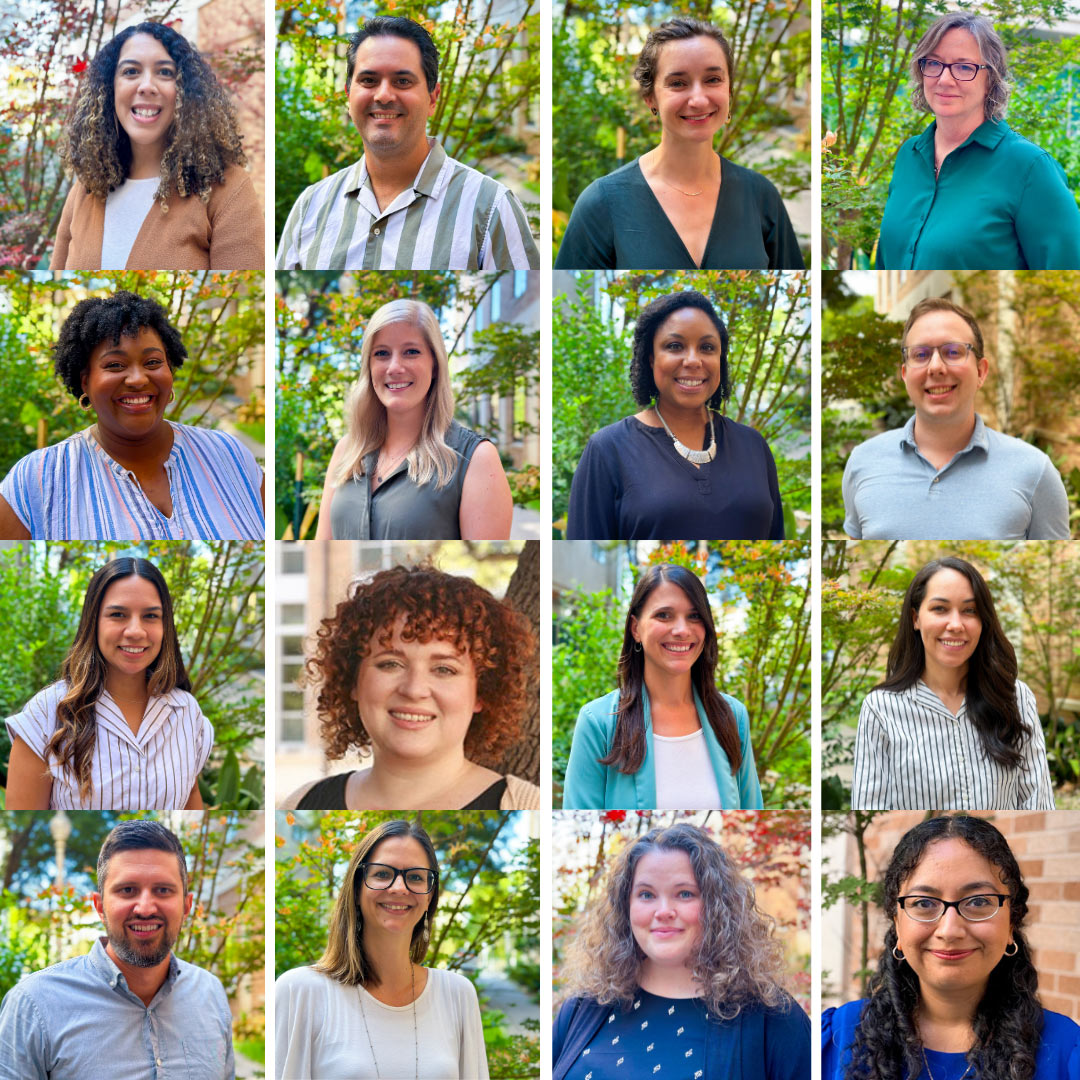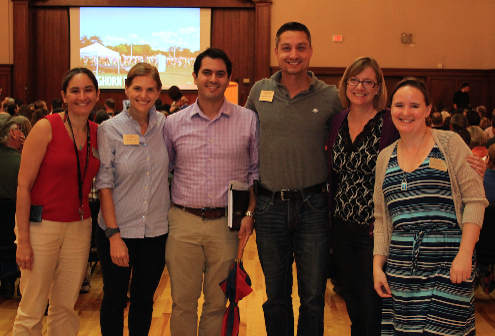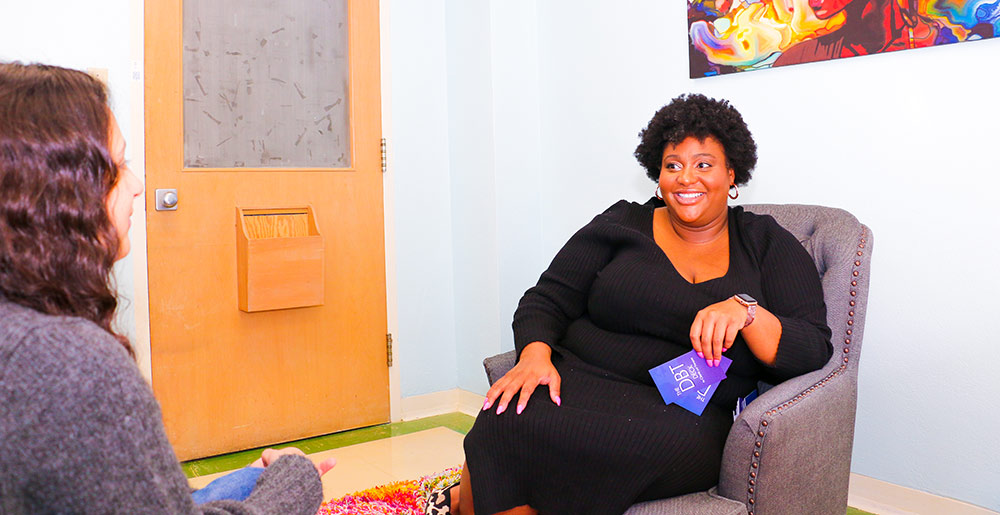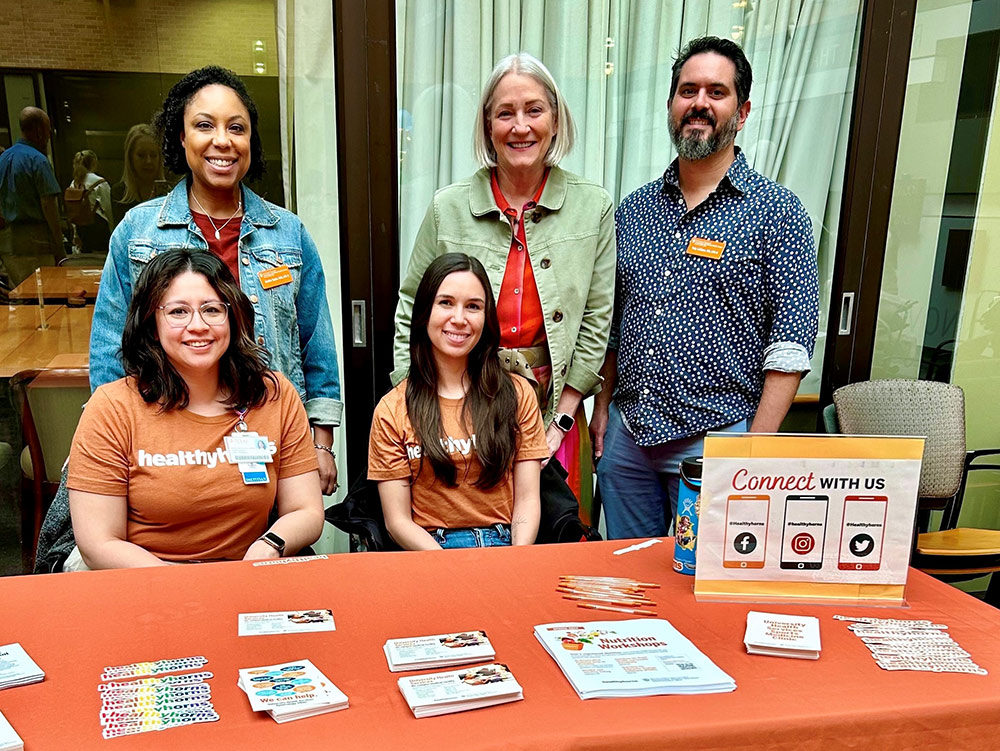Celebrating 10 Years of CARE: Supporting Student Mental Health on Campus
Published: January 8, 2025
The Counselors in Academic Residence Program or CARE, a partnership between the Counseling and Mental Health Center (CMHC) and the Office of the Provost at UT Austin, celebrates 10 years of enhancing mental health support for Longhorns. By embedding licensed CMHC mental health professionals within the colleges and schools, CARE assures that students can easily access support, making counseling a seamless part of the university experience.
As active members of their academic communities, CARE counselors assist students with various concerns ranging from stress management and test anxiety to depression. CARE provides outreach, workshops, individual counseling and referrals that are customized to fit the needs of students. Since its founding, CARE has helped thousands by offering essential assistance and knowledge to combat the stigma surrounding mental health and foster resilience.

Beginnings of CARE
Dr. David Laude, a Professor of Chemistry at UT Austin, has directly seen how students' achievements are impacted by non-academic issues, especially mental health concerns. “In my years of teaching large 500-student chemistry classes, I would encourage students to reach out if they ever needed help,” Laude added. Many did, and I witnessed directly that their challenges extended well beyond the classroom, from personal crises to, occasionally, significant mental health issues. However, there was no organized method on campus at the time to help these individuals directly in their communities. Since advisers did not have the specific expertise necessary to address complex mental health issues, I would personally walk them to the Student Services Building.
When Laude joined the Provost's Office a few years later, he was given the responsibility of raising four-year graduation rates. It was then that he realized non-academic challenges—particularly mental health issues—were significant obstacles to students' achievement. At that point, he recognized an opportunity to back a new concept to create accessible environments within each college, where students could more comfortably seek the help they needed. Dr. Laude and Dr. Chris Brownson, who was the Director of the Counseling and Mental Health Center at the time and now AVP for Health and Well-being, collaborated to create the CARE concept. It would place mental health counselors in the academic units to increase access to mental health support. Laude provided pilot funding and CMHC established CARE with counselors housed in six colleges and schools. The counselors divided their time between providing one-on-one counseling, collaborating with administrators, staff and faculty on initiatives to support student mental health within the CSU, and promoting mental health awareness.
Launching CARE: A Collaborative Effort
Collaboration, preparation and commitment were necessary to make CARE a reality. Laura Dupuis, LCSW-S, was chosen to oversee its creation.
Dupuis was already a clinician within the CMHC's Voices Against Violence program at the time of her appointment. VAV provides UT Austin students who have experienced interpersonal violence with group services, therapy and confidential advocacy.
We started by compiling data on how to create the collaboration and organize the program. Focus groups and discussions with campus partners were conducted in order to learn about their unique needs and cultures. Additionally, we spent a great deal of time constructing the clinical model and referral system.
- Laura Dupuis, LCSW-S, Director, CARE and Campus Support

In addition to Dupuis, the very first counselors included Toby LeBlanc, LPC-S, Abby Simpson, LCSW, Mike Andorka, PhD, Jeni Wade, LCSW-S and Alicia Enciso Litschi, PhD. The Undergraduate College (previously the College of Undergraduate Studies), McCombs School of Business, Moody College of Communication, Cockrell School of Engineering and College of Natural Sciences all initially housed CARE offices. Finding office space that was both close to advisors and accessible for students while maintaining privacy was one of the beginning challenges.

Laura was pleasantly surprised at the program's positive reception. "We weren't sure how faculty and staff would respond at first to working with counselors, but they welcomed our work and utilized these services to the fullest extent possible."
Team lead and one of the program's founding counselors, Toby LeBlanc, LPC-S, CARE Counselor for the McCombs School of Business and Medical Withdrawal Coordinator, offered his thoughts on the program's early days. “A memorable moment was realizing just how deeply academic departments cared about their students. While we knew they valued them, I was surprised by how invested staff members were in students' well-being and success. It was heartwarming to see their thankfulness for having us in their spaces. Advisors, especially, appreciated having counseling professionals nearby and easily accessible for students who were struggling.”
CARE had a limited three-year budget during its pilot phase. However, this initial financing was enough to show deans, staff and students the benefits. "In the beginning, we joked about making CARE so indispensable that when our funding ran out, it would be impossible not to continue it," Laude adds. Eventually, as the program grew in popularity, permanent funding was secured.
Community Impact
CARE Counselors are now incorporated into the fabric of campus life with counselors fully embedded within the colleges. “The CARE team's knowledge of our academic culture makes them invaluable teammates," says Anneke Chy, Assistant Dean of the College of Natural Sciences. She noted that CNS collaborates with CARE to lessen stigma and increase accessibility to resources for mental health.

In addition to positive feedback from faculty, students have been advocates for the program. One graduate student shared, “I really appreciate having a counselor right in my college. As a graduate student, I don’t often go to other parts of campus, so it’s so convenient not having to travel far.” Another student added, “I love that she has office hours—I’ve stopped by multiple times, and it’s always convenient and helpful!” A third student mentioned, “She’s caring and understanding during our sessions. Her office setup feels comfortable and homey, making it easy to have one-on-one conversations.” Another student said, “He’s compassionate, and his advice has encouraged me to reflect on tough questions, helping me make informed decisions for my well-being.”

Success Stories and Community Engagement
These testimonies highlight how CARE counselors genuinely care about their students.
CARE has placed a high priority on community involvement in addition to providing counseling, making sure that students are aware of resources from their first days on campus. The idea that help is always available is reinforced by participation in events like Gone to CNS, the McCombs Wellness Fair and frequent features in weekly newsletters, which keep mental health at the forefront.

Looking to the Future
As we look forward, CARE is dedicated to continuing its mission of supporting student mental health. CARE has broadened its scope, currently employing nearly 20 full-time counselors in almost every academic college and school as well as in non-academic units such as University Housing and Dining.
"We will continue to strengthen our relationships across the university while leveraging data to meet the evolving needs of new generations of students," said Dupuis. A top priority of CARE is focused on listening to students and developing programs that accurately represent their needs and experiences.
Join Us in Prioritizing Mental Health
As we celebrate a decade of CARE, we encourage staff, professors and students to learn more about CARE and its invaluable resources. Students should know that their mental health is important and that CARE is here to support you. Whether you're struggling with stress, need advice or just want to know more about maintaining mental health, we encourage you to contact us. Our top priority is your well-being.
The journey of CARE is confirmation of the importance of mental health support in educational settings. By working together, we can establish a culture that values well-being and enables every student to excel.
Find out more about CARE and the Counseling and Mental Health Center.


